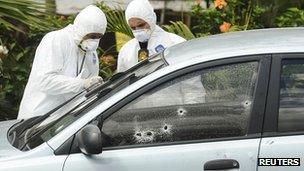Honduran journalists face 'growing threat'
- Published

Former anti-drugs adviser Alfredo Landaverde was killed on Wednesday
Journalists in Honduras are facing growing danger, the country's human rights commissioner has warned.
Ramon Custodio was speaking to the Spanish news agency, Efe, a day after a radio host was shot dead.
Luz Marina Paz was the 17th media worker to be killed in Honduras over the past couple of years, rights groups say.
Honduras has the highest murder rate in the world: 82 killings per 100,000 people, according to the UN.
Ms Paz and her driver were shot dead by gunmen on motorcycles as they travelled through the capital, Tegucigalpa.
The journalist, who had a morning news programme, was reported to have received death threats for refusing to pay extortion money.
Hours earlier, gunmen had shot at the offices of La Tribuna newspaper, injuring a security guard.
"We are in more danger than ever, because we don't know where the attacks against journalists and media organisations are coming from," La Tribuna's editor, Adan Elvir, told Efe.
His comments were echoed by Human Rights Commissioner Ramon Custodio.
"The danger we all in Honduras are experiencing is intensifying in an important part of society, namely the media, which are suffering threats, attacks and murders," Mr Custodio said.
Government officials have also been targeted, especially those linked to the fight against drug trafficking.
On Wednesday, a former anti-drugs adviser Alfredo Landaverde was shot dead in the same area of Tegucigalpa as Ms Paz.
Mr Landaverde, who was travelling in a car with his wife, was killed by unidentified gunmen on a motorbike.
He had been an outspoken critic of police corruption.
Mr Landaverde accused police officers of being behind the murder in 2009 of the country's head of anti-drug trafficking operations, retired Gen Julian Aristides Gonzalez.
Police upheaval
According to rights groups, some 17 journalists have been killed in Honduras since 2009 when the military helped to overthrow the then president Manuel Zelaya.
Current President Porfirio Lobo, who was elected in November 2009, expressed deep regret at the news of Ms Paz's murder.
"There is no doubt that we are facing an escalation (in violence) and we have to identify clearly where it is coming from," Mr Lobo said.
"Given the difficult moments the national police is experiencing, there are some who are taking advantage of the latest upheaval."
Last month, dozens of police officers were sacked in a crackdown on corruption and organised crime.
The alleged involvement of officers in the high-profile murders of two students in November also increased calls for police reform.
The Honduran government has begun deploying troops to help combat criminal gangs and drug traffickers.
- Published30 November 2011
- Published23 November 2011
- Published4 November 2011
- Published7 July 2011